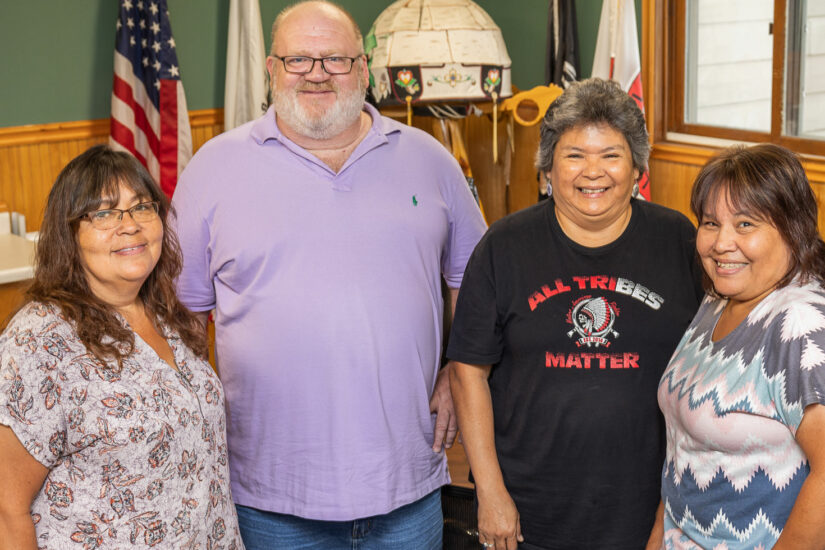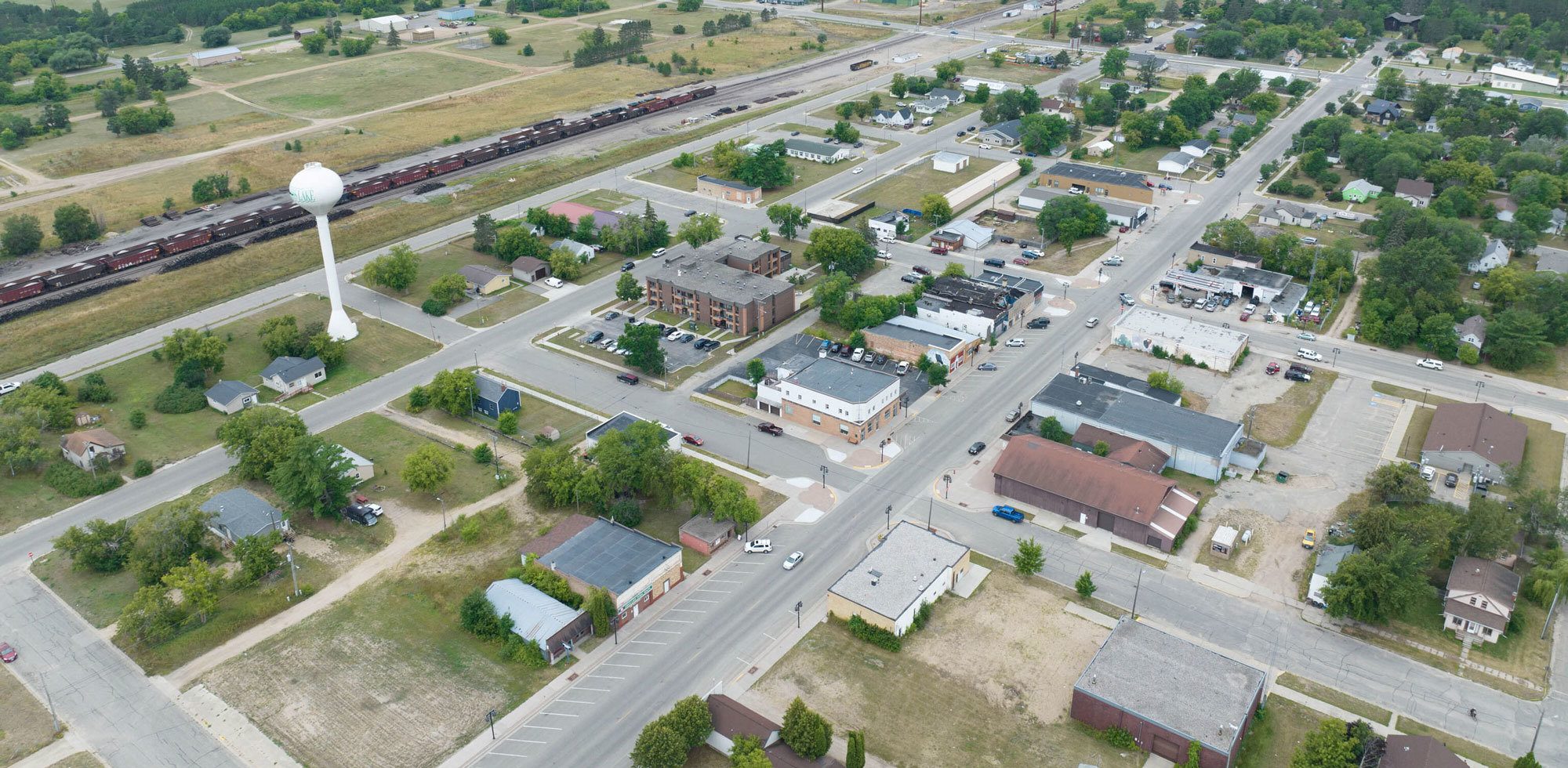
Help With Housing
Grants help Leech Lake Band fight homelessness, create pathways to housing stability
By Elizabeth Foy Larsen | Photography by John Linn | Illustration by Chris McAllister
When they arrived in Central Minnesota in the early 1700s, the Ojibwe called Cass Lake Gaa-Mi-Squa-Wah-Sko-Koo—the place of many red cedars. By the time Cass Lake was formally established in 1893, the city was a stop on the newly built Great Northern Railway. In addition to a booming lumber industry, the federal government provided forestry and conservation careers. Still more jobs arrived in 1922 when the Bureau of Indian Affairs established the Consolidated Chippewa Agency to serve all of Minnesota’s Ojibwe tribes. It chose Cass Lake as its headquarters.
The 1920 census shows this city situated at the southwest corner of an iconic Minnesota lake had 2,100 residents.
Lumber towns are susceptible to boom-and-bust cycles, and Cass Lake was no exception. Today, the city has a population of 675. A former wood treatment facility is now a superfund site. Hazardous chemicals have leached into the soil and groundwater on land that is now part of the Leech Lake Band of Ojibwe reservation.
But it’s not just environmental harms that pose a threat to the wellbeing of the Leech Lake Reservation community. According to a 2018 Amherst H. Wilder study of Native Americans experiencing homelessness or near homelessness in Minnesota, 48 percent responded that they had lost their primary nighttime residence within 14 days of the survey and lacked the resources or support networks to regain housing. Half of the unhoused population on reservations are children, youth and elders. Seventy-seven percent have been without a permanent residence for at least one year or had experienced homelessness four or more times during the last three years.
The Solution: Affordable Housing
Affordable and stable housing is a cornerstone to economic stability for individuals and the communities they call home. According to the Wilder survey, adults experiencing homelessness on reservations are less likely to be employed and more likely to suffer from chronic physical and mental health conditions. Half of the respondents said the biggest barrier to finding a permanent home is a lack of affordable housing.
“Housing is foundational to community and economic development,” said Zach Tabatt, nonprofit development program officer at the Initiative Foundation. “We are in a time when communities can accelerate business development if they make the right investments. When there is a lack of affordable housing, a company in a town with available housing will be able to win new employees away from competitors if they can provide affordable places to live.”
The Leech Lake Band of Ojibwe has about 10,000 enrolled members, 5,000 of whom live on the 677,000-acre Leech Lake Reservation. The area spans Cass, Itasca, Beltrami, and Hubbard counties and includes the city of Cass Lake. In 2021, Cass County determined that part of its American Rescue Plan Act (ARPA) funding would be dedicated to affordable housing. The band has identified an immediate need for 486 housing units in Cass Lake, including workforce housing for employees of the Cedar Lakes Casino and Hotel, which opened in 2019.
To support these priorities, the Initiative Foundation has made grants of nearly $200,000 to the Leech Lake Band of Ojibwe Housing Authority, Anishinabe Legal Services, and Lakes Area Habitat for Humanity to fight homelessness on all fronts and to create pathways to housing stability. The grants are supported by the Otto Bremer Trust and through the Philanthropic Preparedness, Resilience and Emergency Partnership program of The Funders Network, a community-building nonprofit based in Florida.

Helping Homebuyers
Located in Cass Lake, the Leech Lake Band of Ojibwe Housing Authority (LLHA) develops affordable homes and housing opportunities for band members living on the reservation. Today, there are 317 people on its waiting list for housing. The housing authority also provides culturally sensitive services to help tenants and homeowners become self-sufficient, which in turn helps build the foundation for healthy and safe communities. They help low-income people buy homes, provide confidential services to youth experiencing homelessness, and offer a range of classes—from money management skills to how to understand rental agreements—all while celebrating the community’s inherent strengths.
“What means the most to this community are family, unity, and the environment,” said Harry Entwistle, executive director for the housing authority.
Entwistle recently approached First National Bank North in Walker, which had expressed an interest in supporting the community, and proposed a donation to help Leech Lake families buy homes. The bank made $50,000 available for each of the last three years, which has provided 30 native families with $5,000 to support equity investments or closing costs. All 30 families had been pre-approved for a housing loan. Similarly, a $41,250 grant from the Initiative Foundation will enable up to eight individuals who have completed a homebuyers program to receive down payment support. The support is part of a larger stable housing solution that will help homebuyers gain equity.
“In the future that’s something you can pass on to your loved ones,” said Entwistle, who hopes band members see the tangible benefits through people they know and decide to apply for housing support, too.
Building for the Future
To have affordable housing, you need to have actual homes. Lakes Area Habitat for Humanity (LAHFH) is a Brainerd-based nonprofit that pairs families with new and affordable volunteer-built homes. In 2021, they requested $250,000 of Cass County’s American Rescue Plan money to build four to five new homes.
Part of the grant requires that LAHFH match the grant amount. Executive Director Kevin Pelkey said this is now within reach thanks in part to a $50,000 grant from the Initiative Foundation. “Our goal is to raise $1.2 to $1.6 million to deliver fully two years of housing,” he said. “And, we’ve got a sustainability model to go on from there.” The plan is to build 10 new houses.
A partner-based collaboration increases the project’s chances of success. “It’s not just Habitat and the county,” said Pelky, who noted that his organization is working with the county administrator, two county commissioners, Leech Lake Tribal Housing Authority, the band’s development commission, the city of Cass Lake and the Region Five Development Commission. The group meets monthly and anticipates seeing the first homes built in May 2023.
“I’ve been involved in many groups who sit around the table and talk about the need for more affordable housing,” Pelkey said. “This is the first real thing that I have seen in 25 years that has the potential of not just coming to fruition for the first two years, but to be sustainable [going forward].”
As part of a separate initiative, the Cass Lake Housing and Redevelopment Authority is acquiring vacant commercial buildings in downtown Cass Lake to redevelop for mixed-use, with affordable apartments in the upper floors.
“Reacquiring land is something that we need to do to be ready and able to meet the needs of things that we’re trying to accomplish for the people of Leech Lake,” said LeRoy Staples-Fairbanks III, District III councilman for the Leech Lake Band of Ojibwe. “People are doubling up with relatives. They’re living off of band land and renting elsewhere. So there absolutely is a housing issue. There’s a home ownership issue. There’s a safe housing issue.”
Eviction Protection and Education
Stable housing isn’t just about houses. It’s also about knowing your rights as a renter. In 2019, Anishinabe Legal Services (ALS), which provides free legal assistance to low-income people for civil legal matters, completed its most recent strategic plan. A major goal was to identify the single biggest unmet need for community members. The answer? Housing.
“Daily, we’re getting calls requesting help for people who are facing eviction or are dealing with repairs not getting done,” said Cody Nelson, ALS’s executive director. “Some tenants don’t have heat. Some need their locks changed—basic things that touch on safety and what we call habitability.” The threat of eviction is particularly devastating to people who already are in vulnerable situations.
“I call it the modern-day Scarlet Letter,” he said. “Finding housing is already hard for low-income people [due to] income requirements, credit checks, and criminal history checks. Once someone is evicted, it’s nearly impossible to get back into housing.”
While the human toll can be catastrophic, Nelson also points out homelessness exacts a financial toll on a community’s resources, especially if a family’s children are placed into the foster care system. “It’s a huge human toll for those children and for the [caregivers],” he said. “But, when you think about just the enormous cost of foster care, the cost to the courts, to the county attorney or the tribal attorney, the public defender, foster care payments—it’s also [expensive] for the government, whether that be the county or the tribe.”
That scenario can also put families in an almost impossible bind. “It happens a lot where child protection will say they will return the children if a parent gets a two-bedroom home, but they can’t now because [the family] is couch hopping,” said Nelson.
A $100,000 Initiative Foundation grant will help support ALS’s work in eviction protection and landlord education. The funding will be used to provide residents with legal protection and by reducing dangerous living conditions. The ALS and Lakes Area Habitat for Humanity grants are part of a $1 million-plus Transformative Funding for Nonprofits effort supported by the Otto Bremer Trust. See other grantees on page 32.
“We feel like we can really make some positive changes for low-income folks in their ability to have safe and secure shelter,” Nelson said. “This program has been planted in the ground for quite a while, but the Initiative Foundation is bringing it to life. And we’re really grateful to them for that and excited to see the positive impact it will have.”